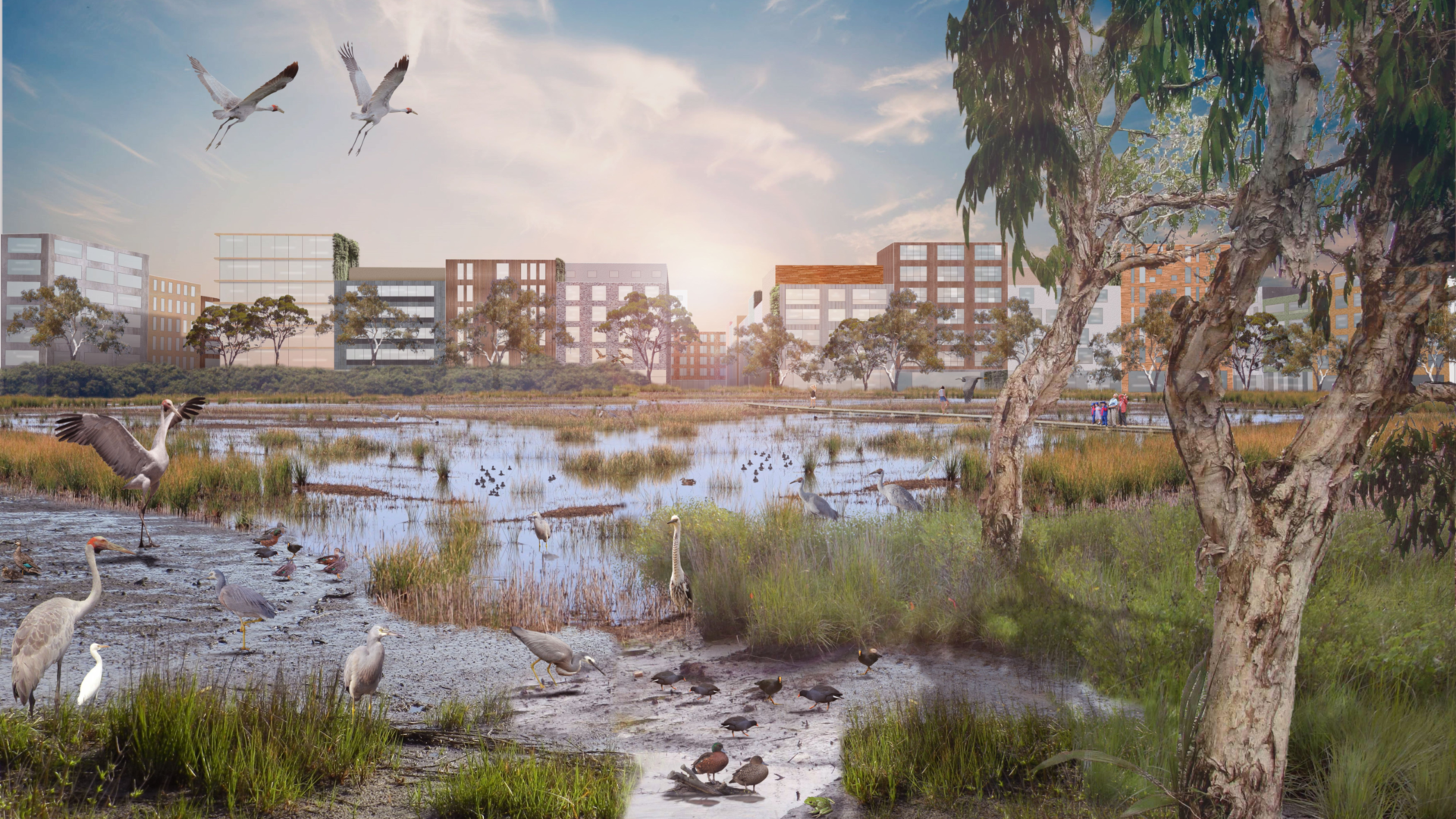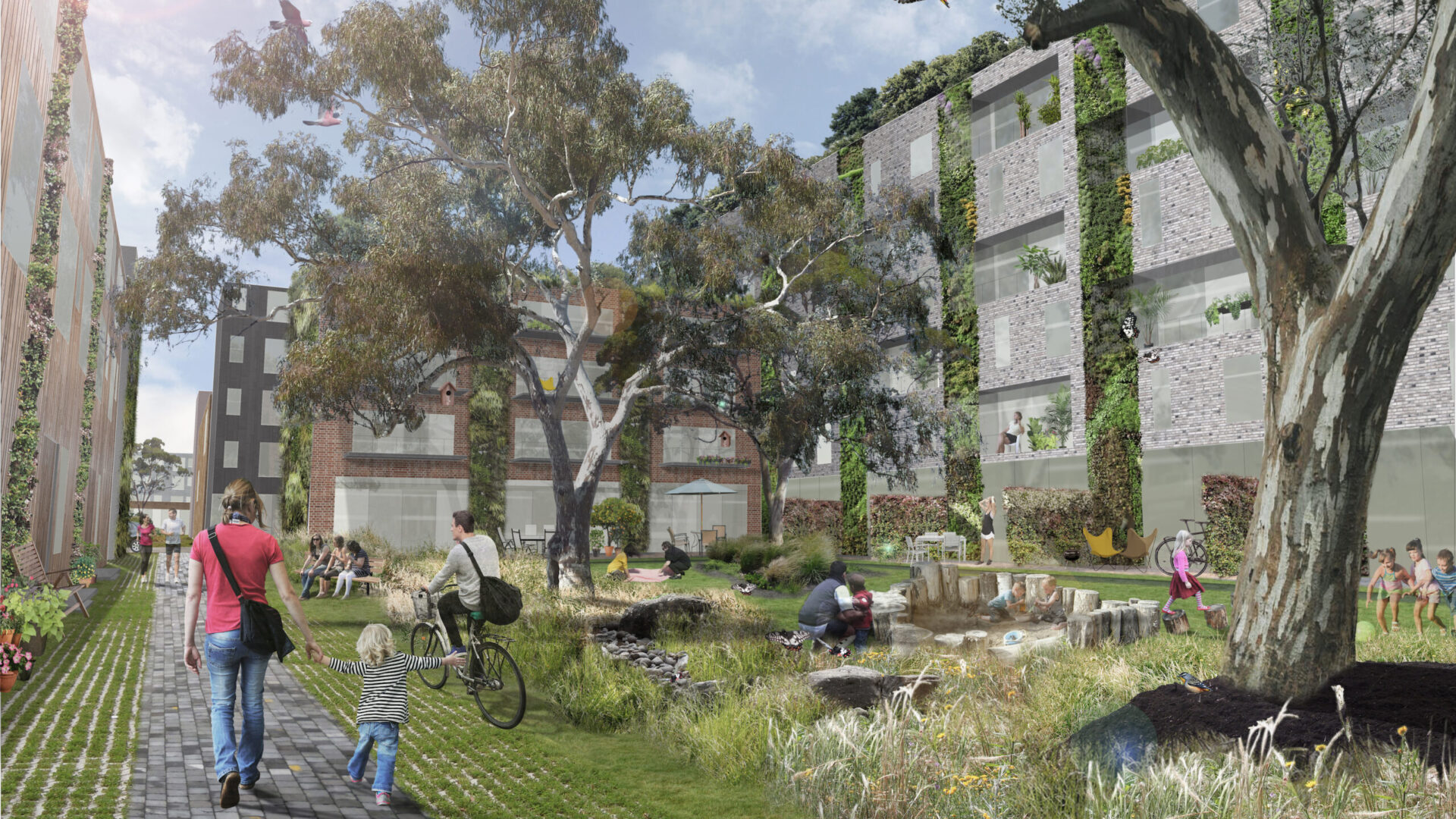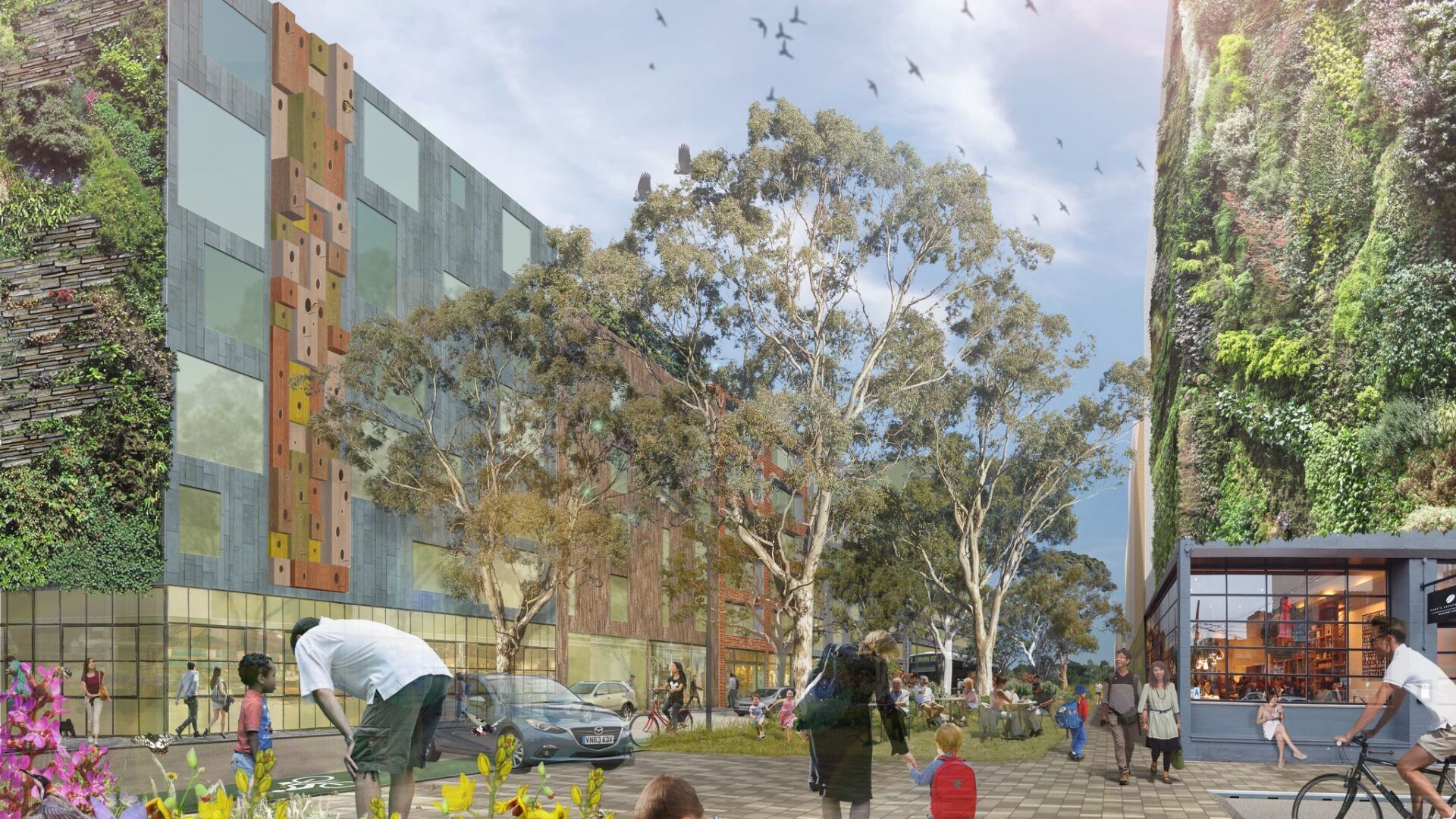


Regenerating the Ecology of Fishermans Bend Past Event
Tickets
Date
Venue
Access
Accessible bathroom, Low sensory / relaxed, Seating available, Wheelchair accessibleCombining ecology with design is essential for realising the vision for Fishermans Bend to be “a thriving place and a leading example for environmental sustainability, liveability, connectivity, diversity and innovation.” Translating vision into reality requires regenerating the urban landscape to support greater habitat diversity and creating a network of open spaces that enhance ecological connectivity.
This event brings together design expertise with urban ecological researchers to explore the role of designing for urban food webs that support biodiversity, alongside water sensitive design, to achieve nature-positive urban spaces. They’ll reveal incremental strategies to support the growth of a Fishermans Bend ecological network, designed as experiments for testing and adaptive monitoring overtime. They’d also love to hear your input and connections to water and biodiversity in the area.
Join FB Ideas for a lively session to explore the why, how, what and where behind our vision to regenerate the ecology of Fishermans Bend.
The discussion will be followed by light refreshments.
Participants
Professor Sarah Bekessy leads the ICON Science research group at RMIT University which uses interdisciplinary approaches to solve complex biodiversity conservation problems. She is particularly interested in understanding the role of human behaviour in conservation, in designing cities to encourage ‘every day nature’ experiences and in defining and measuring ‘nature positive’ development. Sarah is a Lead Councillor of The Biodiversity Council, a member of the Board of Bush Heritage Australia, and is a member of the Eminent Scientist Advisory Group for WWF Australia.
Dr. Alex Felson is a landscape architect and certified senior ecologist, merging academia and practice to shape resilient urban environments. His expertise spans applied ecology, urban hydrology, landscape architecture, environmental planning and extends to landscape biotechnologies, such as recycled waste rain gardens and thermo-greenwall technologies. Focusing on innovative public space design, Felson informs large-scale regional projects with rigorous research, combining landscape ecology and geo-spatial planning. Through the Urban Ecology and Design Lab (UEDLAB) at the University of Melbourne, he blends conservation and constructed ecosystems with low-impact development, creating urban spaces resilient to climate change and biodiversity loss.
Janet Bolitho has a deep and long standing fascination with Fisherman’s Bend. She has written weekly observations about Fisherman’s Bend and surrounds on her blog Port Places for over ten years. Where the Birrarung meets Port Phillip Bay (Naarm) is a particular focus. Janet was a member of the Fisherman’s Bend Development Board, and is on the committee for Westgate Biodiversity: Bili Nursery & Landcare and a member of the Port Melbourne Historical and Preservation Society.
Dr. Meenakshi Arora is a Professor in Environmental Engineering at the University of Melbourne. Dr Arora has extensive experience in both research and university teaching including PhD supervision, and has published extensively in a number of highly ranked journals. Her main research focus is on water resource management, integrated catchment modelling, urban water cycle modelling, water quality, stormwater management and stream health. She works in close collaboration with government and industry including Victorian Water authorities like Melbourne Water, Yarra Valley Water, Southeast Water, Western Water and Tyre Stewardship Australia.
Amira Moshinsky is a student in the Master of Engineering (Environmental) and simultaneously manages a circular-economy, innovation project, Remix Raingardens which was the winner of the City of Melbourne’s 2023 Fishermans Bend Innovation Challenge. She is passionate about designing and implementing sustainable solutions that mitigate ecological destruction. With a background in psychology, Amira is committed to fostering connections and opportunities for collaboration to create change that considers intersectional perspectives. She is interested in using public sustainability installations as a means of engaging and educating the community on environmental issues.
Date
Tickets
Venue
Access
Accessible bathroom, Low sensory / relaxed, Seating available, Wheelchair accessibleCombining ecology with design is essential for realising the vision for Fishermans Bend to be “a thriving place and a leading example for environmental sustainability, liveability, connectivity, diversity and innovation.” Translating vision into reality requires regenerating the urban landscape to support greater habitat diversity and creating a network of open spaces that enhance ecological connectivity.
This event brings together design expertise with urban ecological researchers to explore the role of designing for urban food webs that support biodiversity, alongside water sensitive design, to achieve nature-positive urban spaces. They’ll reveal incremental strategies to support the growth of a Fishermans Bend ecological network, designed as experiments for testing and adaptive monitoring overtime. They’d also love to hear your input and connections to water and biodiversity in the area.
Join FB Ideas for a lively session to explore the why, how, what and where behind our vision to regenerate the ecology of Fishermans Bend.
The discussion will be followed by light refreshments.
Participants
Professor Sarah Bekessy leads the ICON Science research group at RMIT University which uses interdisciplinary approaches to solve complex biodiversity conservation problems. She is particularly interested in understanding the role of human behaviour in conservation, in designing cities to encourage ‘every day nature’ experiences and in defining and measuring ‘nature positive’ development. Sarah is a Lead Councillor of The Biodiversity Council, a member of the Board of Bush Heritage Australia, and is a member of the Eminent Scientist Advisory Group for WWF Australia.
Dr. Alex Felson is a landscape architect and certified senior ecologist, merging academia and practice to shape resilient urban environments. His expertise spans applied ecology, urban hydrology, landscape architecture, environmental planning and extends to landscape biotechnologies, such as recycled waste rain gardens and thermo-greenwall technologies. Focusing on innovative public space design, Felson informs large-scale regional projects with rigorous research, combining landscape ecology and geo-spatial planning. Through the Urban Ecology and Design Lab (UEDLAB) at the University of Melbourne, he blends conservation and constructed ecosystems with low-impact development, creating urban spaces resilient to climate change and biodiversity loss.
Janet Bolitho has a deep and long standing fascination with Fisherman’s Bend. She has written weekly observations about Fisherman’s Bend and surrounds on her blog Port Places for over ten years. Where the Birrarung meets Port Phillip Bay (Naarm) is a particular focus. Janet was a member of the Fisherman’s Bend Development Board, and is on the committee for Westgate Biodiversity: Bili Nursery & Landcare and a member of the Port Melbourne Historical and Preservation Society.
Dr. Meenakshi Arora is a Professor in Environmental Engineering at the University of Melbourne. Dr Arora has extensive experience in both research and university teaching including PhD supervision, and has published extensively in a number of highly ranked journals. Her main research focus is on water resource management, integrated catchment modelling, urban water cycle modelling, water quality, stormwater management and stream health. She works in close collaboration with government and industry including Victorian Water authorities like Melbourne Water, Yarra Valley Water, Southeast Water, Western Water and Tyre Stewardship Australia.
Amira Moshinsky is a student in the Master of Engineering (Environmental) and simultaneously manages a circular-economy, innovation project, Remix Raingardens which was the winner of the City of Melbourne’s 2023 Fishermans Bend Innovation Challenge. She is passionate about designing and implementing sustainable solutions that mitigate ecological destruction. With a background in psychology, Amira is committed to fostering connections and opportunities for collaboration to create change that considers intersectional perspectives. She is interested in using public sustainability installations as a means of engaging and educating the community on environmental issues.
